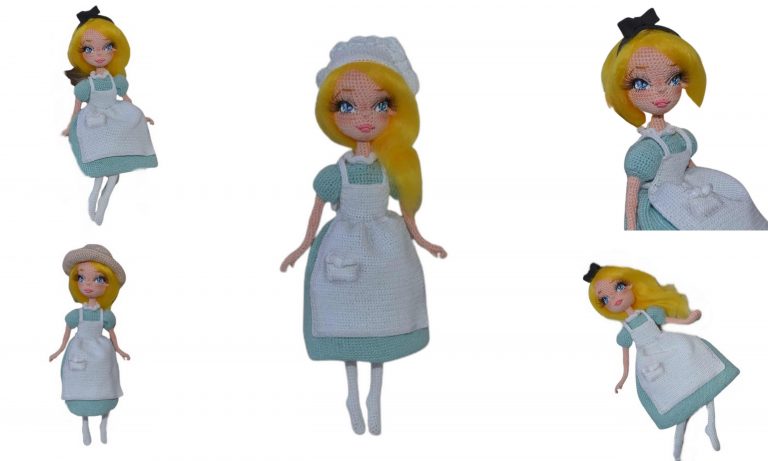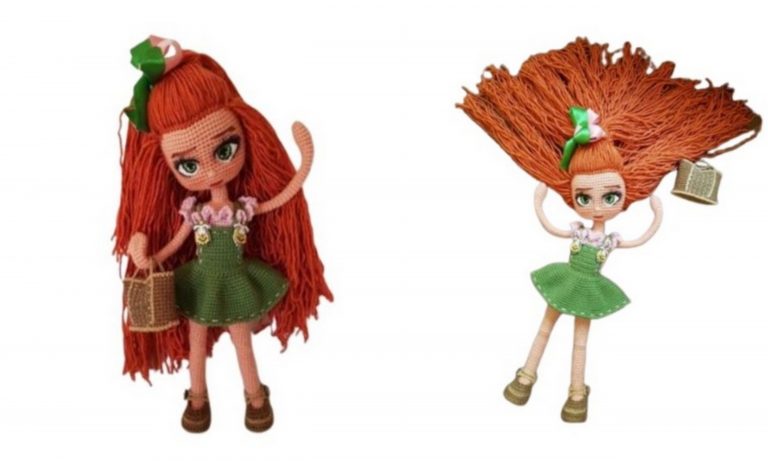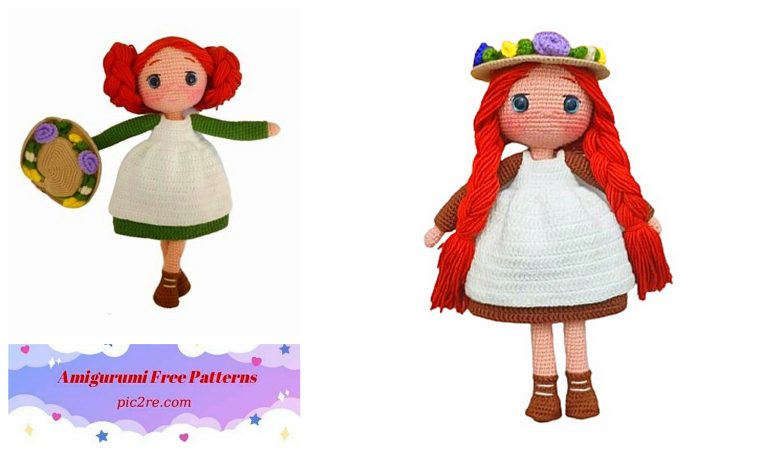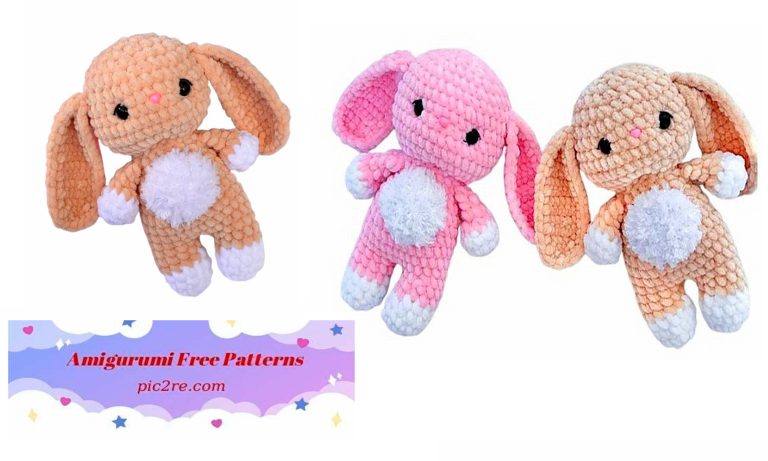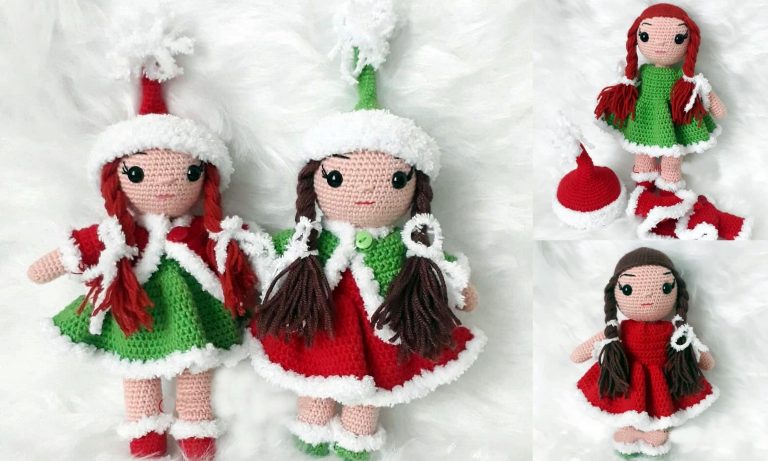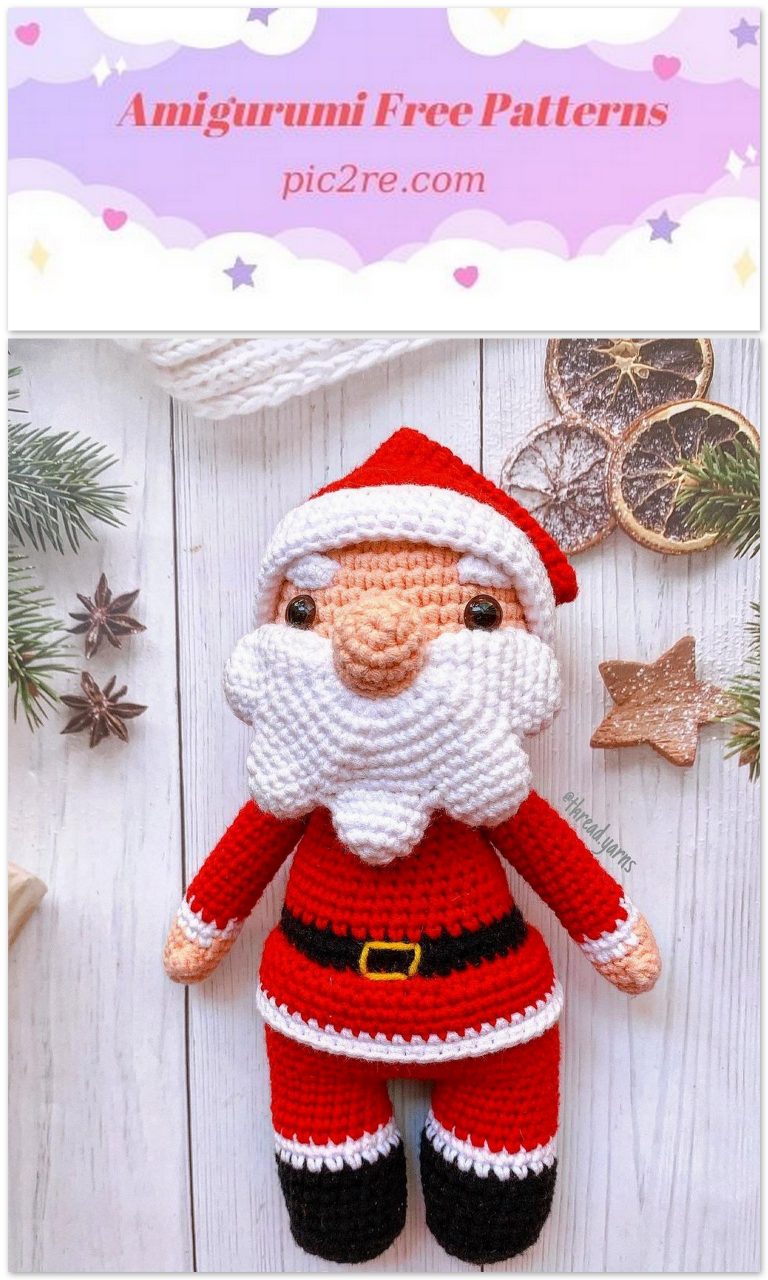Amigurumi Elf Noel Free Pattern
List of required materials:
Yarn:
– Yarn Art Jeans: 01(white), 07(beige), 26(red), 52(green), 40(brown) for the insole, 53(black), 86(milky) for the hair.
– Yarn Art Velor white.
– a little yellow or gold yarn for embroidering the buckle.
– a thin contrast thread – a marker. Be sure to use a marker!
– a hook of the right size for your yarn, I have it No. 2;
– filler (holofiber, sintepukh);
– glass eyes 10mm;
– Glue Moment Crystal;
– white felt for the white of the eyes;
– a piece of plastic for insoles, I use old discount cards;
– a needle for stitching parts;
– scissors;
– pastels for toning cheeks.
If desired, you can use a weighting agent, I use aquarium soil.
The growth of the finished toy, with the specified materials 25cm.
Legend:
sc – single crochet, knit for both walls of the loop, unless otherwise indicated in the description;
ch – air loop;
sl-st – connecting column, do not knit it too tight;
Dec – decrease (2sc together for the front walls)
İnc – increase (2sc from one loop)
HDC – half double crochet
DC – double crochet
* – after this asterisk, the number of repetitions of knitted loops is indicated
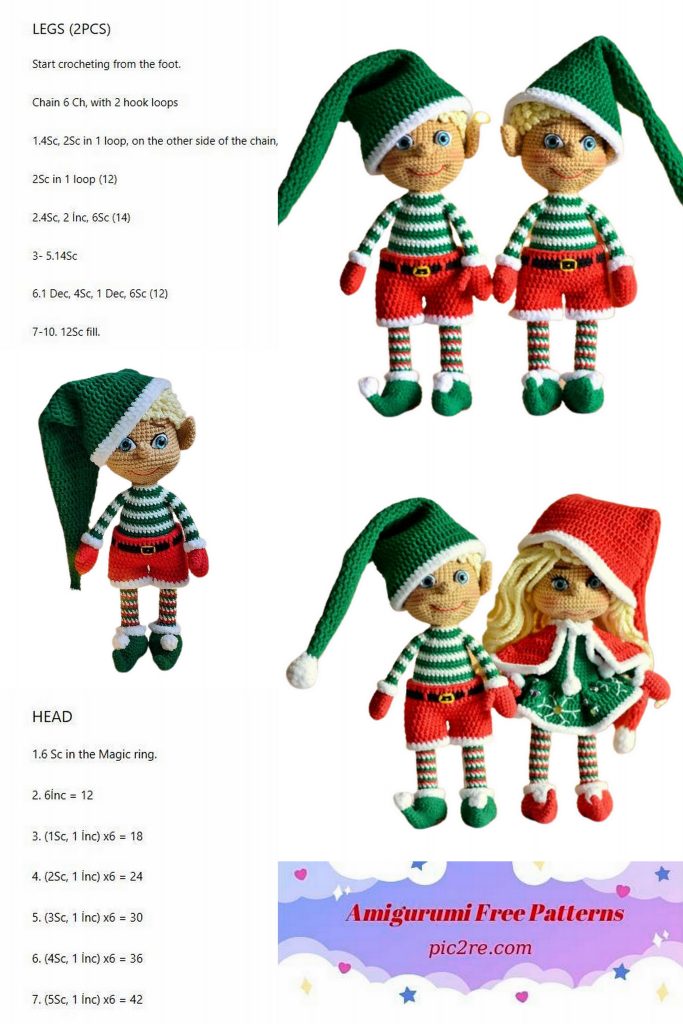
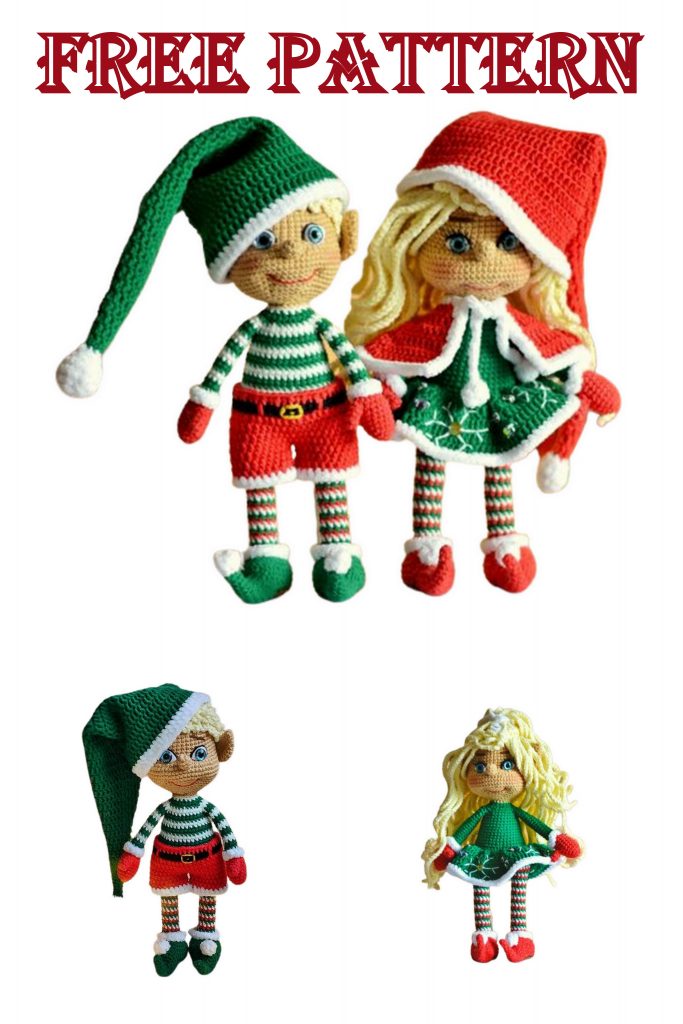
General recommendations for knitting toys:
– I recommend that you first carefully read the description of the toy, then start knitting.
– Choose a hook according to your density! There should be no distance between the columns, the filler should not shine through, but you don’t need to knit too tightly either, the fabric should turn out to be plastic, and not be wooden.
– Use a good filler to prevent bumps and bumps when filling the toy.
– All parts are knitted in a spiral, the lifting loop at the beginning of the row and the connecting loop at the end of the row are not used.
– All loops, except for the decrease loop, are knitted behind both walls of the loop. Knitting loops for the front or back wall is indicated in the description of the row.
– Please note that the connecting column is not knitted tight.
– Use a thin, contrasting marker thread to mark the beginning of the row. Before knitting the first loop of the row, throw it alternately: before knitting and after knitting.
– The toy is knitted face out, fig.1.
– The thread is changed as follows:
You knit the last sc not to the end, i.e. insert the hook behind both walls of the loop (when knitting a decrease, we insert the hook behind the two front walls), bring the thread out – there are two
loops, then take a thread of a different color and knit these loops with a new color.
– When making the head, enter and exit all the threads at the bottom of the head, in the place where the head will be sewn to the body, so that it is convenient to fasten and hide them.
Arms:
The right and left hand are knitted differently to hide the color transition. First we knit mittens. We start knitting in red. We fill only the palm.
Finger:
1. 6sc into magic ring – 6sc
2-4. 6sc
Fasten the thread, cut. Tie two fingers, for the right and left hand. We do not stuff our fingers.
Palm:
1.6sc
2.6inc – 12sc
3. (3sc, inc) *3 – 15sc
4-6. (3 rows) 15sc
Next, we attach a finger, the place of attachment for the right and left hands is different. When attaching the parts, we put them facing each other, we pick up the finger loops from the inside.
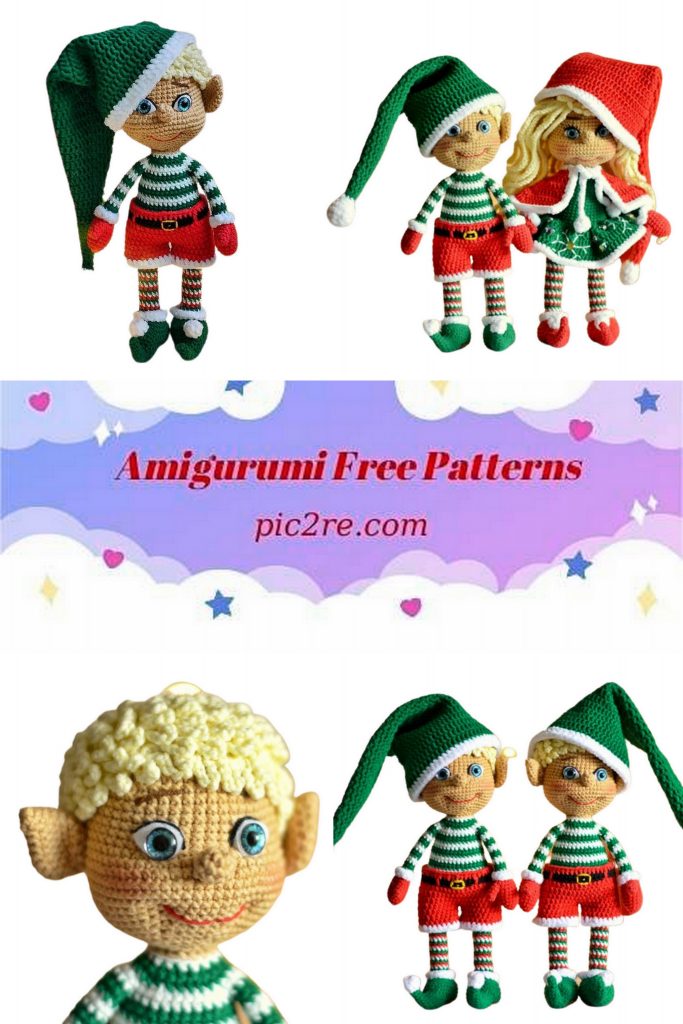
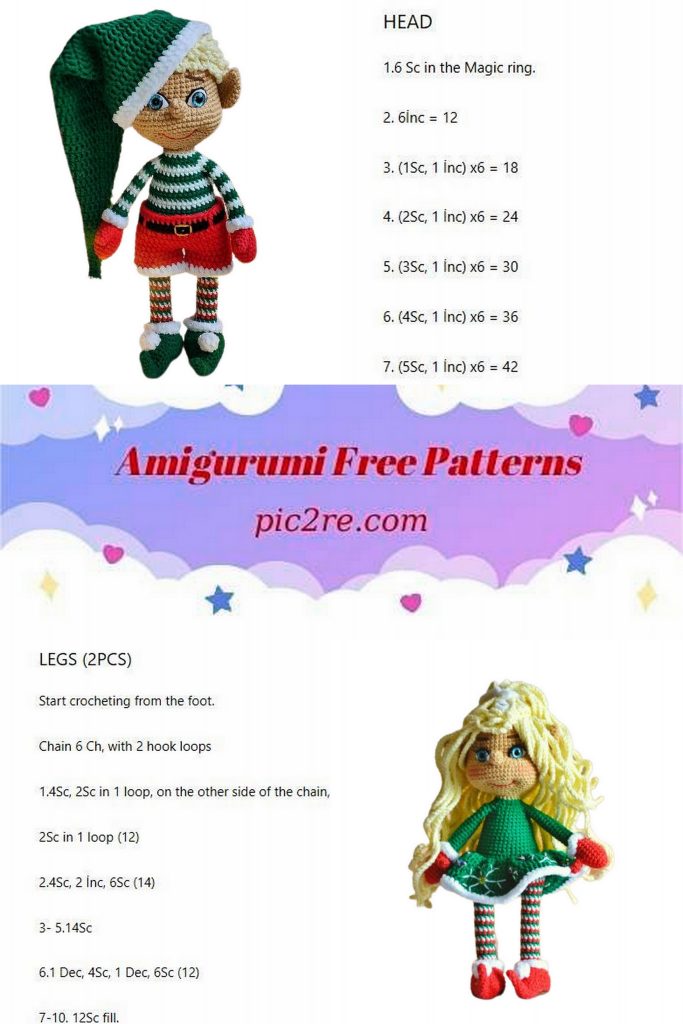
Right hand:
7. 3sc, 2sc with finger, 10sc – 15sc
8. 3sc, 4sc on the finger, 10sc – 17sc
9. 4sc, dec, 6sc, dec, 3sc – 15sc
Left hand:
7. 10sc, 2sc with finger, 3sc – 15sc
8. 10sc, 4sc on the finger, 3sc – 17sc
9. 3sc, dec, 6sc, dec, 4sc – 15sc
Further, the hands are knitted in the same way.
10. (3sc, dec) *3 – 12sc, change the thread to white, fasten the red thread and cut off.
Fill your palm well. Knit the next row behind the back wall.
11. (2sc, dec)*3 – 9sc
12. 9sc in white.
Next, alternate white and green colors in 2 rows.
Knit an offset loop as needed so that the color transition does not shift or go to the side.
13-27. (15 rows) 9sc
Finish the hand with one row of white. Fasten the thread, cut.
Attach plush yarn to row 11 and work 12sc behind the front walls of row 11, holding the hand mitten down.
Legs:
We knit two identical legs.
We start by knitting the nose of the shoe in green:
1. 6sc into magic ring – 6sc
2.6sc
3. 5sc, inc – 7sc
4. 6sc, sc behind the back wall – 7sc
5. 6sc, inc behind the front wall of the previous (3rd) row – 8sc
6. 7sc, sc behind the back wall – 8sc
7. 7sc, inc to the front the wall of the previous (5th) row – 9sc
8. 8sc, sc behind the back wall – 9sc
9. 8sc, inc to the front wall of the previous row – 10sc
10. 9sc, sc behind the back wall – 10sc
11. 9sc, inc to the front wall of the previous row – 11sc
12. 10sc, sc behind the back wall – 11sc
13. 10sc, inc to the front wall of the previous row – 12sc
14. 9sc, inc, sc, inc – 14sc
15. 10sc, inc*4 – 18sc
16.18sc
Fasten the thread, cut.
Step back from the marker clockwise 1sc, put a marker, for the next 8sc the nose will join the insole, mark the 8th loop with a marker for convenience.
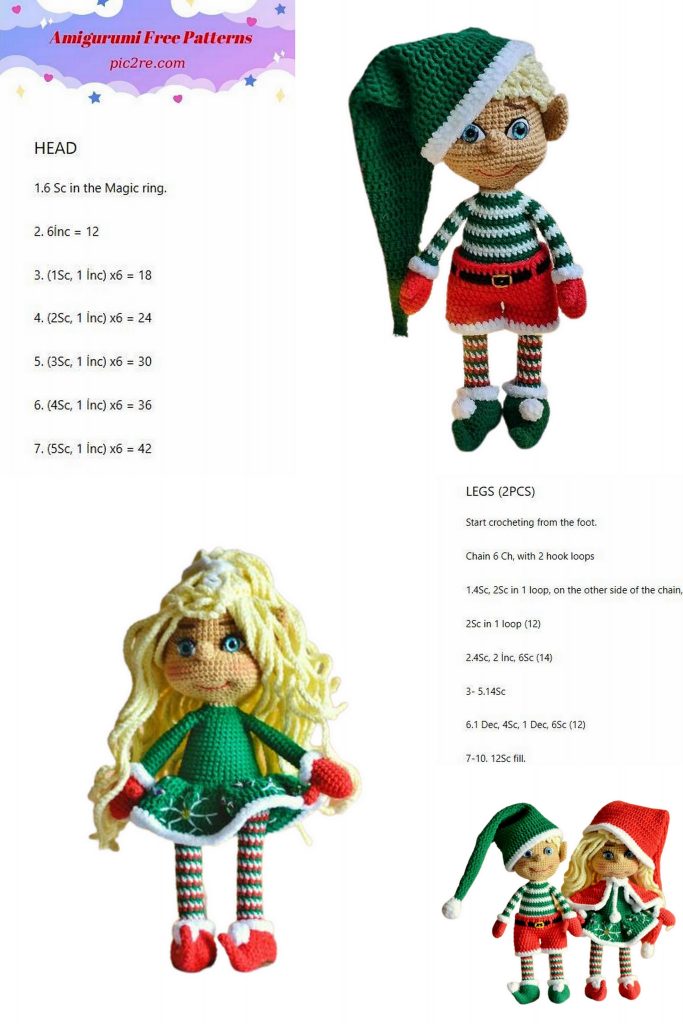
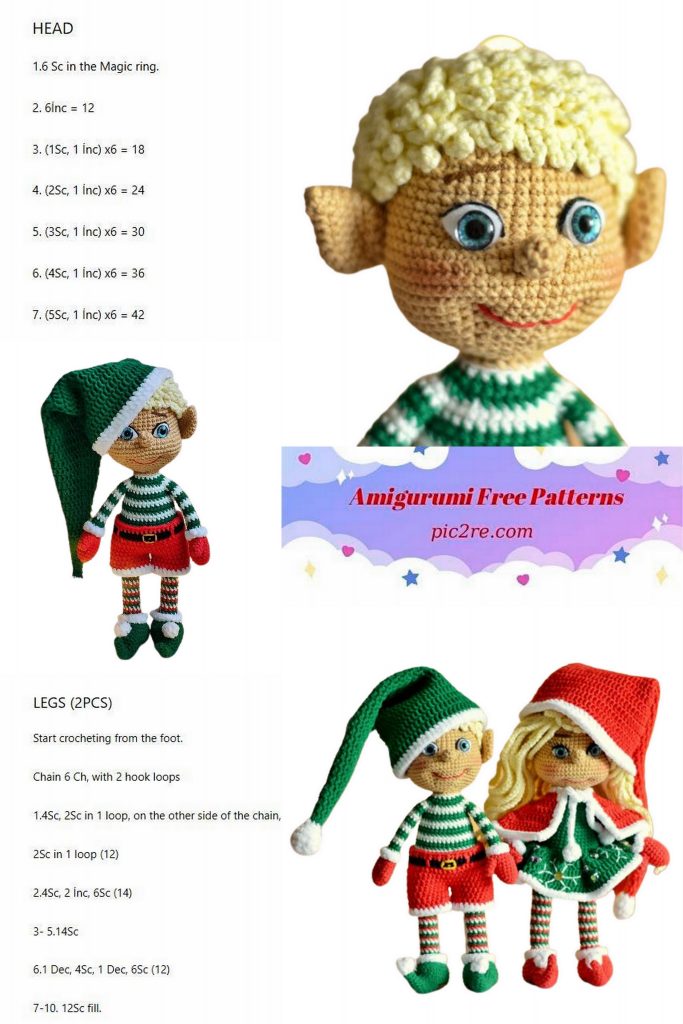
Insole, brown:
We dial 6ch, we start knitting from the second loop from the hook.
1. inc, 3sc, 4sc in the last loop, turn the chain, 3sc, inc – 14sc.
We put a marker.
2. inc*2, 3sc, inc*4, 3sc, inc*2 – 22sc
3. (sc, inc)*2, 3sc, inc*8, 3sc, (sc, inc)*2 – 34sc,
change the thread to green.
We circle the insole on the plastic, cut out two parts.
We knit the next row behind the back wall, attach the nose of the shoe, note that we knit the insole behind the back wall, and the nose behind both walls of the loop.
Attach the nose to the insole as shown in the photo, right sides to each other.
4. 13sc, 8sc with shoe toe, 13sc – 34sc
In the next row, when knitting a decrease, you need to hook the front wall of the loop knitted together with the nose on the hook to avoid the appearance of holes.
5. 12sc, dec, 8sc, dec, 12sc – 34sc
We knit the following decreases in the usual way.
6. 11sc, dec, 8sc, dec, 11sc – 32sc
7. 11sc, dec, 6sc, dec, 11sc – 30sc
We insert the insole, we stuff the nose well, then we stuff the leg tightly as we knit.
8. (3sc, dec) * 6 – 24sc
9. (2sc, dec) *6 – 18sc
We fix and cut the thread. The marker runs exactly down the middle of the back of the leg. If desired, weighting agents can be added to the legs. I am using aquarium soil.
For the right leg, we retreat 4sc clockwise from the marker, attach the white thread.
For the left leg, we retreat 4 sc counterclockwise from the marker, attach a white thread.
We align the marker as we knit, knitting an offset loop so that the color transition remains inside the leg and does not move.
Knit the next row behind the back wall
10. (sc, dec) * 6 – 12ch
In the next row we attach a red thread, in the 12th row we attach a green thread, then we change the color of the thread each row.
11-34. (24rows) 12sc
We finish knitting the leg in white so that the last loop is exactly on the side of the leg. We fix the threads, cut off.
Attach a plush thread to the 9th row and knit 18sc behind the front walls of the 9th row, keeping the leg of the feet down.
Body:
We stuff the body tightly as we knit.
From the right leg to the left, knit in red 6 ch
1. 12sc on the left leg, 6sc on the ch chain, 12sc on the right leg, 3sc on the chain, – 33sc, change the thread to green, put a marker. We did not work 3sc in the chain to the end of the row in order to place a marker in the middle of the back.
We start knitting the second row with 3sc along the chain.
2. (5sc, inc) * 6 – 42sc
We knit the next row in white, alternating colors each row up to the 9th row inclusive.
3. 3sc, inc, (6sc, inc) * 5, 3sc – 48sc
4-8. (5 rows) 48sc
9. 7sc, dec, (14sc, dec) *2, 7sc – 45sc
We knit the next two rows in white, then change the thread to green. Fasten the red thread and cut off. Next, alternate the colors in two rows. Tightly fill the junction of the legs and body, in this place there should not be a void.
10. (13sc, dec) *3 – 42sc
11.42sc
12. 6sc, dec, (12sc, dec) * 2, 6sc – 39sc
13-14. 39sc
15. (11sc, dec) * 3 – 36sc
16-17. 36sc
18. 5sc, dec, (10sc, dec) * 2, 5sc – 33sc
19-20. 33sc
21. (9sc, dec) * 3 – 30sc
Pay attention, in the next row we attach hands, the marker should be exactly in the middle of the back. Knit alignment loops if necessary. Try on your hands so that the color transition remains on the inside and the fingers look slightly inward. We pick up the loops of the hand from the inside, applying the parts with the right side to each other.
22. 7sc, 3sc with hand, 10sc, 3sc with hand, 7sc – 30sc
In the next row, holes may form at the junction of the arms, so we will knit the junction of the arms and body with an invisible decrease. To do this, we will knit the first loop of the arm together with the front wall of the loop of the body, knitted together with the arm in the previous row. See photo. In the same way, knit on the other side of the hand, picking up the loop of the previous row by the front wall.
23. 7sc, 6sc on the hand, 10sc, 6sc on the hand, 7sc – 36sc
24. 2sc, dec, (4sc, dec) *5, 2sc – 30sc
25. (3sc, dec) *6 – 24sc
26. sc, dec, (2sc, dec) * 5, sc – 18sc, change thread to body color
27. 18sc behind the back wall.
Fasten the thread, leave a long end for sewing, cut off. Stuff the body and neck very tightly, so that when sewing on the head does not collapse.
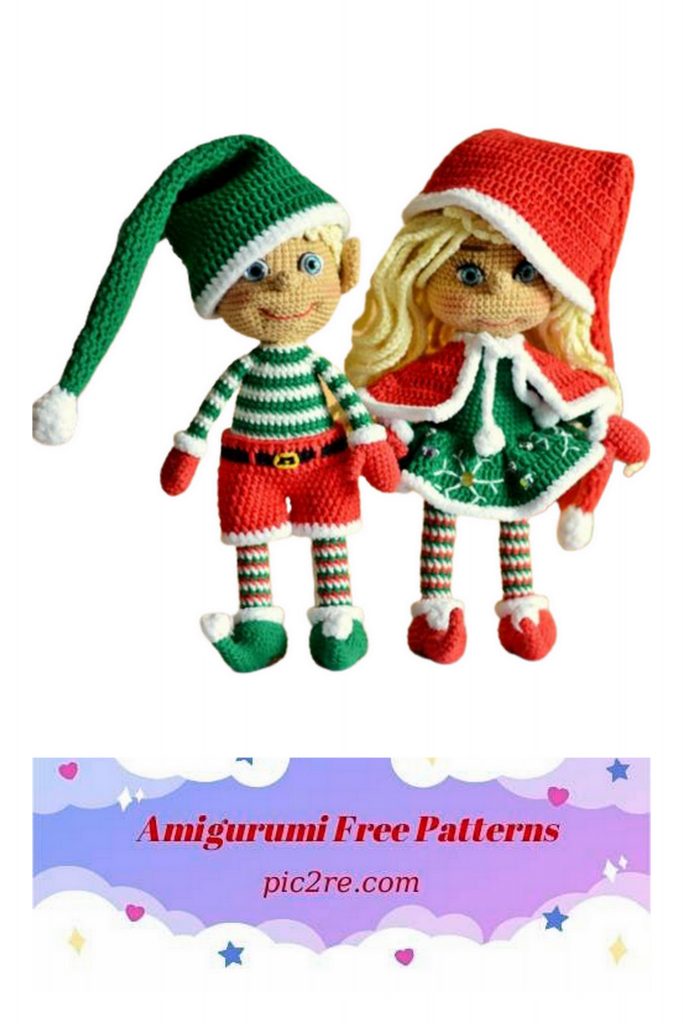
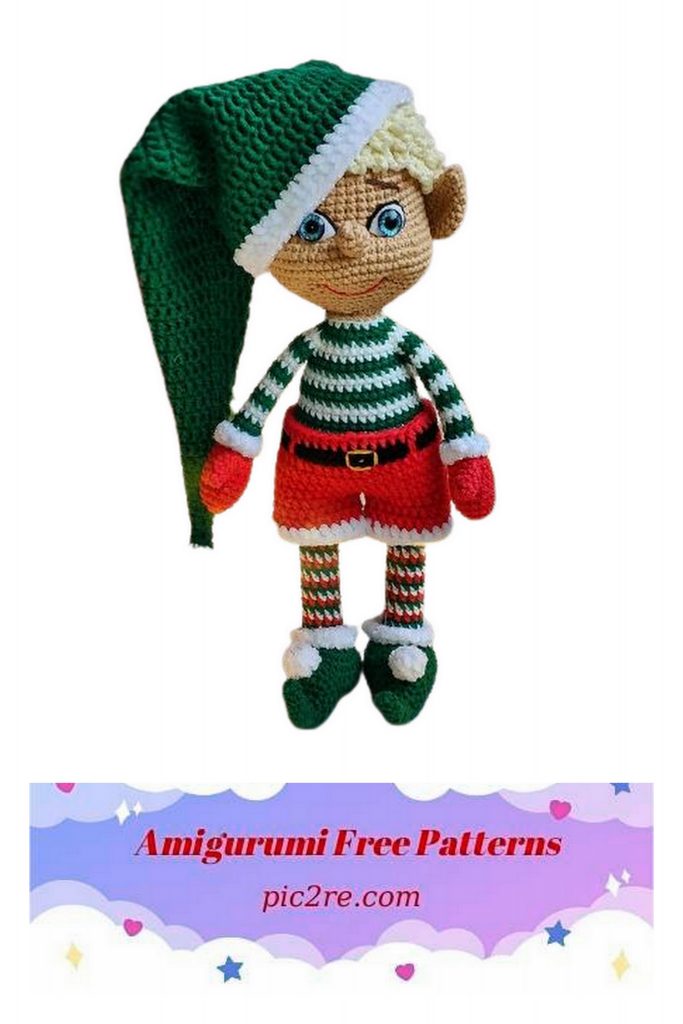
Shorts:
Shorts need to be knitted a little looser than usual, for this you can take a half-size larger hook or just knit not tight.
With a red thread, dial 45ch, close around. The shorts are knitted in half-columns with a crochet. We start the row with 2 ch, counting them as the first loop.
1-4. 45hdc
Next, separate the pants.
1. 22 hdc, 23hdc knit by connecting 23 and the first loop together, closing around.
2-3. 23hdc
The next row is knitted with plush thread.
4.23sc
Fasten the threads, cut off, hide the ends.
The second leg is knitted in the same way, but we knit the first loop from the junction of 23 and 1 loops of the first leg.
Next, we attach a black thread to the top and knit two rows of 45sc each, change the thread to red, knit 45hdc, fasten the threads, hide. We embroider loops with a red thread, a buckle with a yellow thread. We put shorts on the elf.
Pompoms for shoes:
From plush yarn, knit pompoms for shoes:
1. 6sc into magic ring
2.6sc
Fasten the thread, cut. Choose a place for the pom-pom: the tip of the nose of the shoe or the top of the shoe. Sew the pom-poms to the shoes with white yarn Yarn Art Jeans, dividing it in two.
Head:
We knit in flesh color.
If you use the eyes on a secure fastening, then insert them in the 16th row, stepping back from the marker about 21-22sc, the distance between the eyes is 6-8sc.
1. 6sc into magic ring – 6sc
2.6inc – 12sc
3. (sc, inc)*6 – 18sc
4. sc, inc, (2sc, inc) * 5, sc – 24sc
5. (3sc, inc)*6 – 30sc
6. 2sc, inc, (4sc, inc)*5, 2sc – 36sc
7. (5sc, inc)*6 – 42sc
8. 3sc, inc, (6sc, inc)*5, 3sc – 48sc
9-16. (8 rows) 48sc
17. 17sc, (inc, sc) *2, inc, 4sc, (inc, sc) *2, inc, 17sc – 54sc
18.54sc
19. 17sc, (inc, 2sc) *2, inc, 6sc, (inc, 2sc) *2, inc,
17sc – 60sc
20-22. (3 rows) 60sc
23. 18sc, (dec, 2sc)* 2, dec, 6sc, (dec, 2sc), dec, 16sc
24.54sc
25. (7sc, dec)*6 – 48sc
26. 3sc, dec, (6sc, dec)*5, 3sc – 42sc
27. (5sc, dec)*6 – 36sc
28. 2sc, dec, (4sc, dec)*5, 2sc – 30sc
29. (3sc, dec)*6 – 24sc
30. sc, dec, (2sc, dec) * 5, sc – 18sc
Fasten the thread, cut. Stuff your head tightly.
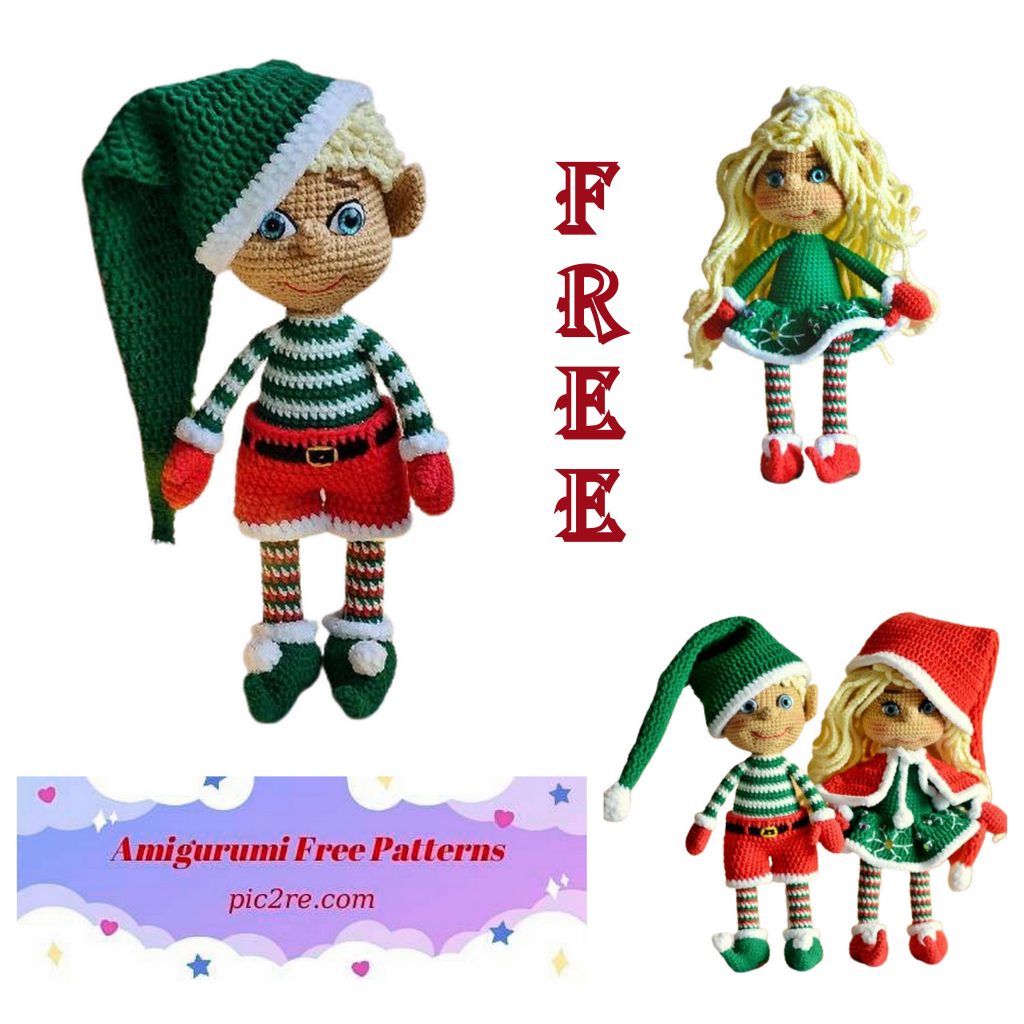
Nose:
We knit in flesh color.
1. 6sc into magic ring – 6sc
2. (inc, sc) * 3 – 9sc
3.9sc
4. (sc, dec) * 3 – 6sc
Fasten the thread, leave a long end for sewing, cut off. Put some filler in the nose.
Between the increments of 17 and 19 rows is the middle of the face, we will be guided by it in the further design of the head.
In order to make it easier to find the place for sewing on the nose, turn the head over, mark two loops with pins, between the 18th and 20th rows of the head – in the 19th row with increments, in the middle, retreating 2 loops to the center from the increments. The dots in the photo indicate the increments of the series. Sew on the nose. Bring the thread out at the bottom of the head.
Next, we will make eye tightening and smiles.
First, let’s put labels for the eyes. For convenience, we turn our head over again, with pins we select a loop between the first increments of the 17th row from the middle of the face. The distance between the pins is 6 loops.
Now we will make marks for a smile, to do this, turn your head to a normal position, step back 7 rows from the eye mark, focusing on the sewn nose, step back 4 loops from the middle of the face and highlight the next, 5th loop with pins.
Thread the needle with flesh-colored thread or dental floss. Insert the needle from the bottom of the head, into the hole, withdraw at point 1, enter at point 2, withdraw at point 3, pull the thread, insert the needle at point 4, then pull the thread again, a cheek should form.
Repeat tightening two times. Repeat the tightening with the second eye.
Next, embroider a smile. To do this, insert the red thread into the needle. Insert the needle into the hole from the bottom of the head, bring the needle out in the lower tightening on the left, insert the thread into the tightening on the right, pull the thread slightly, bring the needle out approximately in the middle of the smile two or three rows below the tightening, grab the thread and insert the needle into the same hole, tighten the thread and form a smile.
Glue on the eyes. We take a glass eye, draw the white of the eye on a piece of paper, the way we like it, you can make a round highlight or more anatomical, choose to your taste.
I draw a slightly elongated shape. We cut out our blank from paper and cut out two highlights from felt. On the Moment Crystal glue, glue the glare in the place of the eyes, wait for it to dry, glue the eye itself, now we are waiting for the eye to dry completely.
After the eyes are completely dry, we embroider the contour of the eye from above with a black thread. Insert the needle from the bottom of the head, bring it out at point 1 and enter it at point 2, while slightly pulling the thread, if the thread does not lie, it can be slightly glued using a toothpick and a very small amount of Moment Crystal glue.
Ears:
We knit two identical parts in flesh color.
1. 4sc into magic ring
2. (sc, inc) * 2 – 6sc
3. (2sc, inc)*2 – 8sc
4. (3sc, inc)*2 – 10sc
5. (4sc, inc)*2 – 12sc
6. (5sc, inc)*2 – 14sc
7-8. 14sc
9. (5sc, dec)*2 – 12sc
10.6dec
Leave a long end for sewing, secure the thread, cut off. Pull off the hole from the remaining 6sc, sew behind the side of the ear to the head, stepping back from the eyes about 7-8sc, between 15 and 20 rows.
Hair:
With the color of the hair we knit the part behind the back wall.
1. 6sc into magic ring – 6sc
2.6inc – 12sc
3. (sc, inc)*6 – 18sc
4. sc, inc, (2sc, inc) * 5, sc – 24sc
5. (3sc, inc)*6 – 30sc
6. 2sc, inc, (4sc, inc)*5, 2sc – 36sc
7. (5sc, inc)*6 – 42sc
8. 3sc, inc, (6sc, inc)*5, 3sc – 48sc
9-11. (3 rows) 48sc
We knit one sl-st, then turn the part over and knit along the resulting spiral of the front loops:
7ch, 2sl-st * repeat until the end of the spiral.
Got short curls. Try on a wig, fix with pins and sew to head.
Cap:
We start knitting with plush yarn:
1. 6sc into magic ring
2.6inc 12sc
3. (sc, inc) * 6 – 18sc
4.18sc
5. (sc, dec) – 12sc
Put filler.
6.6dec-6sc
Attach a green thread, knit 6sc, then
we knit with double crochets, we also knit increments from
double crochets. We start the row with 2 or 3ch, counting ch as the first loop.
1. (2dc inc)*2 – 8dc
2.8dc
3. (3dc, inc)*2 – 10dc
4.10dc
5. (4dc, inc)*2 – 12dc
6.12dc
7. (5dc, inc)*2 – 14dc
8. (6dc, inc)*2 – 16dc
9. (7dc, inc)*2 – 18dc
10. (8dc, inc)*2 – 20dc
11. (9dc, inc)*2 – 22dc
12. (10dc, inc)*2 – 24dc
13. (11dc, inc)*2 – 26dc
14. (12dc, inc)*2 – 28dc
15. (13dc, inc)*2 – 30dc
16. (14dc, inc)*2 – 32dc
17. (15dc, inc)*2 – 34dc
18. (16dc, inc)*2 – 36dc
19. (17dc, inc)*2 – 38dc
20. (18dc, inc)*2 – 40dc
21. (19dc, inc)*2 – 42dc
22. (20dc, inc)*2 – 44dc
23. (21dc, inc)*2 – 46dc
24. (22dc, inc)*2 – 48dc
25. (23dc, inc)*2 – 50dc
26. (24dc, inc)*2 – 52dc
27. (25dc, inc)*2 – 54dc
28. (26dc, inc)*2 – 56dc
29. (27dc, inc)*2 – 58dc
30-32. (3 rows) 58dc
Fasten the thread, cut. Next, knit with plush thread.
33-34. 58sc
Fasten the thread, cut. Hide the ends.
Sew the head to the body. Dry or oil pastels
using a hard brush to make a light blush on the elf.
In the absence of pastels, you can use regular blush.
Addition to the description of the elf Noel.
Elf Noemi knits according to the description of Elf Noel, the differences are minimal.
Wig:
The wig turns out to be heavy, so the head will fall over, I recommend making an elf using a frame or simply inserting a strengthener into the body-head when sewing.
You can use a pen body without a stem, thick wire, sushi sticks, etc. I recommend wrapping the stiffener with a woven patch so that it does not come out of the doll.
We knit every second row of the wig behind the back wall.
1. 6sc into magic ring
2. 6 inc behind the back wall – 12sc
3. (sc, inc)*6 – 18sc
4. behind the back wall sc, inc, (2sc, inc) * 5, sc – 24sc
5. (3sc, inc) *6 – 30sc
6. behind the back wall 2sc, inc, (4sc, inc)*6, 2sc – 36sc
7. (5sc, inc)*6 – 42sc
8. behind the back wall 4sc, inc, (6sc, inc) * 5, 4sc – 48sc
9.48sc.
Next, we knit a chain of 50ch into each loop of the 9th row, we knit connecting posts along it, we get a light curl, we make 8 curls short: 6-8 ch each, this will be a bang. There are 48 curls in total.
Next, we knit curls only in the 6th row, knit 52 ch into each loop, knit connecting posts into the ch chain, while knitting the connecting post into the second loop of the chain, counting from the base of the wig, grab the front wall of the 8th row. Thus, the curls will lie on the head. There are 36 curls in total.
Next, we knit curls of the 2nd row from 54ch, capturing the front walls of the 4th row when knitting the second ch. Only 6 curls.
Dress.
We knit the handles in plain colors after the mittens (green). We enter the main color of the dress (green) in the 10th row of the body, we knit the 11th row of the body behind the back wall, then we knit the body according to the description, but in one color.
For the 11th row of the body, attach the thread and knit the skirt dc with the lifting loops at the beginning of the row, count the lifting loop as the first loop of the row:
1. 2dc in one loop, 3dc in one loop, alternate to the end of the row – 105dc
2-5 (4 rows) 105 dc, change to plush.
6.105 sc
If desired, embroider snowflakes on the skirt, decorate with beads.
Cape:
Cast on 22 stitches in red.
1. 5dc, (3dc in one loop)*2.8dc, (3dc in one loop)*2.5dc
2. 6dc, (3dc single stitch)*2, 2dc, (3dc single stitch)*2, 10dc, (3dc single stitch)*2, 2dc, (3dc single stitch)*2, 6dc
3. 7dc, (3dc single stitch)*2, 4dc, (3dc single stitch)*2, 12dc, (3dc single stitch)*2, 4dc, (3dc single stitch)*2, 7dc
4. 8dc, (3dc single stitch)*2, 6dc, (3dc single stitch)*2, 14dc, (3dc single stitch)*2, 6dc, (3dc single stitch)*2, 8dc
5. 9dc, (3dc single stitch)*2, 8dc, (3dc single stitch)*2, 16dc, (3dc single stitch)*2, 8dc, (3dc single stitch)*2, 9dc
6. 10dc, (3dc single loop)*2, 10dc, (3dc single loop)*2, 18dc, (3dc single loop)*2, 10dc, (3dc single loop)*2, 10dc
Tie around the cape with plush yarn, make two pompoms from the ball in 6sc into magic ring, pull off the ball and tie the strings.
Cap:
The width of the cap will have to be increased due to the hairstyle, so knit the increments in the cap further, according to the same principle, while trying on the cap on the head. Approximately 3-4 more rows of increases, and then according to the description of the cap.
